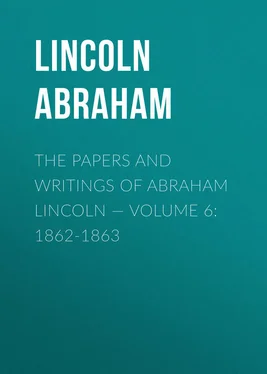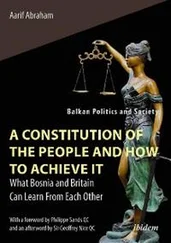Abraham Lincoln - The Papers And Writings Of Abraham Lincoln — Volume 6 - 1862-1863
Здесь есть возможность читать онлайн «Abraham Lincoln - The Papers And Writings Of Abraham Lincoln — Volume 6 - 1862-1863» — ознакомительный отрывок электронной книги совершенно бесплатно, а после прочтения отрывка купить полную версию. В некоторых случаях можно слушать аудио, скачать через торрент в формате fb2 и присутствует краткое содержание. Жанр: foreign_antique, foreign_prose, на английском языке. Описание произведения, (предисловие) а так же отзывы посетителей доступны на портале библиотеки ЛибКат.
- Название:The Papers And Writings Of Abraham Lincoln — Volume 6: 1862-1863
- Автор:
- Жанр:
- Год:неизвестен
- ISBN:нет данных
- Рейтинг книги:3 / 5. Голосов: 1
-
Избранное:Добавить в избранное
- Отзывы:
-
Ваша оценка:
- 60
- 1
- 2
- 3
- 4
- 5
The Papers And Writings Of Abraham Lincoln — Volume 6: 1862-1863: краткое содержание, описание и аннотация
Предлагаем к чтению аннотацию, описание, краткое содержание или предисловие (зависит от того, что написал сам автор книги «The Papers And Writings Of Abraham Lincoln — Volume 6: 1862-1863»). Если вы не нашли необходимую информацию о книге — напишите в комментариях, мы постараемся отыскать её.
The Papers And Writings Of Abraham Lincoln — Volume 6: 1862-1863 — читать онлайн ознакомительный отрывок
Ниже представлен текст книги, разбитый по страницам. Система сохранения места последней прочитанной страницы, позволяет с удобством читать онлайн бесплатно книгу «The Papers And Writings Of Abraham Lincoln — Volume 6: 1862-1863», без необходимости каждый раз заново искать на чём Вы остановились. Поставьте закладку, и сможете в любой момент перейти на страницу, на которой закончили чтение.
Интервал:
Закладка:
I am pressed with a difficulty not yet mentioned — one which threatens division among those who, united, are none too strong. An instance of it is known to you. General Hunter is an honest man. He was, and I hope still is, my friend. I valued him none the less for his agreeing with me in the general wish that all men everywhere could be free. He proclaimed all men free within certain States, and I repudiated the proclamation. He expected more good and less harm from the measure than I could believe would follow. Yet, in repudiating it, I gave dissatisfaction, if not offence, to many whose support the country cannot afford to lose. And this is not the end of it. The pressure in this direction is still upon me, and is increasing. By conceding what I now ask you can relieve me, and, much more, can relieve the country in this important point.
Upon these considerations, I have again begged your attention to the message of March last. Before leaving the Capital, consider and discuss it among yourselves. You are patriots and statesmen, and as such I pray you consider this proposition; and, at the least, commend it to the consideration of your States and people. As you would perpetuate popular government for the best people in the world, I beseech you that you do in nowise omit this. Our common country is in great peril, demanding the loftiest views and boldest action to bring a speedy relief. Once relieved, its form of government is saved to the world; its beloved history and cherished memories are vindicated, and its happy future fully assured and rendered inconceivably grand. To you, more than to any others, the privilege is given to assure that happiness and swell that grandeur, and to link your own names therewith forever.
TO GENERAL G. B. McCLELLAN
MAJOR-GENERAL McCLELLAN:
MY DEAR SIR: — I am told that over 160,000 men have gone into your army on the Peninsula. When I was with you the other day we made out 86,500 remaining, leaving 73,500 to be accounted for. I believe 23,500 will cover all the killed, wounded, and missing in all your battles and skirmishes, leaving 50,000 who have left otherwise. No more than 5000 of these have died, leaving 45,000 of your army still alive and not with it. I believe half or two-thirds of them are fit for duty to-day. Have you any more perfect knowledge of this than I have? If I am right, and you had these men with you, you could go into Richmond in the next three days. How can they be got to you, and how can they be prevented from getting away in such numbers for the future?
A. LINCOLN.
TELEGRAM TO GENERAL H. W. HALLECK
MAJOR-GENERAL HALLECK, Corinth, Mississippi:
They are having a stampede in Kentucky. Please look to it.
A. LINCOLN.
TELEGRAM TO GENERAL J. T. BOYLE
GENERAL J. T. BOYLE, Louisville, Kentucky:
Your several despatches received. You should call on General Halleck. Telegraph him at once. I have telegraphed him that you are in trouble.
A. LINCOLN.
TELEGRAM TO GENERAL J. T. BOYLE
GENERAL J. T. BOYLE, Louisville, Kentucky:
We cannot venture to order troops from General Buell. We know not what condition he is in. He maybe attacked himself. You must call on General Halleck, who commands, and whose business it is to understand and care for the whole field If you cannot telegraph to him, send a messenger to him. A dispatch has this moment come from Halleck at Tuscombia, Alabama.
A. LINCOLN.
ACT OF COMPENSATED EMANCIPATION
July 4, 1862.
FELLOW-CITIZENS OF THE SENATE AND HOUSE OF REPRESENTATIVES:
Herewith is the draft of the bill to compensate any State which may abolish slavery within its limits, the passage of which, substantially as presented, I respectfully and earnestly recommend.
A. LINCOLN.
Be it enacted by the Senate and House of Representatives of the United States of America in Congress assembled: — That whenever the President of the United States shall be satisfied that any State shall have lawfully abolished slavery within and through-out such State, either immediately or gradually, it shall be the duty of the President, assisted by the Secretary of the Treasury, to prepare and deliver to each State an amount of six per cent. interest-bearing bonds of the United States equal to the aggregate value at — dollars per head of all the slaves within such State, as reported by the census of 1860; the whole amount for any one State to be delivered at once if the abolishment be immediate, or in equal annual instalments if it be gradual, interest to begin running on each bond at the time of delivery, and not before.
And be it further enacted, That if any State, having so received any such bonds, shall at any time afterwards by law reintroduce or tolerate slavery within its limits, contrary to the act of abolishment upon which such bonds shall have been received, said bonds so received by said State shall at once be null and void, in whosesoever hands they may be, and such State shall refund to the United States all interest which may have been paid on such bonds.
TELEGRAM TO GENERAL H. W. HALLECK
MAJOR-GENERAL HALLECK, Corinth, Mississippi:
I am very anxious — almost impatient — to have you here. Have due regard to what you leave behind. When can you reach here?
A. LINCOLN.
TELEGRAM TO GENERAL G. B. McCLELLAN
MAJOR-GENERAL McCLELLAN:
General Burnside's force is at Newport News, ready to move, on short notice, one way or the other, when ordered.
A. LINCOLN.
TO SOLOMON FOOT
HON. SOLOMON FOOT, President pro tempore of the Senate.
SIR: — Please inform the Senate that I shall be obliged if they will postpone the adjournment at least one day beyond the time which I understand to be now fixed for it.
Your obedient servant,
A. LINCOLN.
[The same message was addressed to Hon. Galusha A. Grow Speaker of the House of Representatives.]
MESSAGE TO CONGRESS. July 17, 1862
I have inadvertently omitted so long to inform you that in March last Mr. Cornelius Vanderbilt, of New York, gratuitously presented to the United States the ocean steamer Vanderbilt, by many esteemed the finest merchant ship in the world. She has ever since been and still is doing valuable service to the government. For the patriotic act of making this magnificent and valuable present to the country I recommend that some suitable acknowledgment be made.
A. LINCOLN.
MESSAGE TO CONGRESS. July 17, 1862
Considering the bill for "An act to suppress insurrection, to punish treason and rebellion, to seize and confiscate the property of rebels, and for other purposes," and the joint resolution explanatory of said act as being substantially one, I have approved and signed both.
Before I was informed of the passage of the resolution I had prepared the draft of a message stating objections to the bill becoming a law, a copy of which draft is herewith transmitted.
A. LINCOLN.
FELLOW-CITIZENS OF THE HOUSE OF REPRESENTATIVES:
Интервал:
Закладка:
Похожие книги на «The Papers And Writings Of Abraham Lincoln — Volume 6: 1862-1863»
Представляем Вашему вниманию похожие книги на «The Papers And Writings Of Abraham Lincoln — Volume 6: 1862-1863» списком для выбора. Мы отобрали схожую по названию и смыслу литературу в надежде предоставить читателям больше вариантов отыскать новые, интересные, ещё непрочитанные произведения.
Обсуждение, отзывы о книге «The Papers And Writings Of Abraham Lincoln — Volume 6: 1862-1863» и просто собственные мнения читателей. Оставьте ваши комментарии, напишите, что Вы думаете о произведении, его смысле или главных героях. Укажите что конкретно понравилось, а что нет, и почему Вы так считаете.












